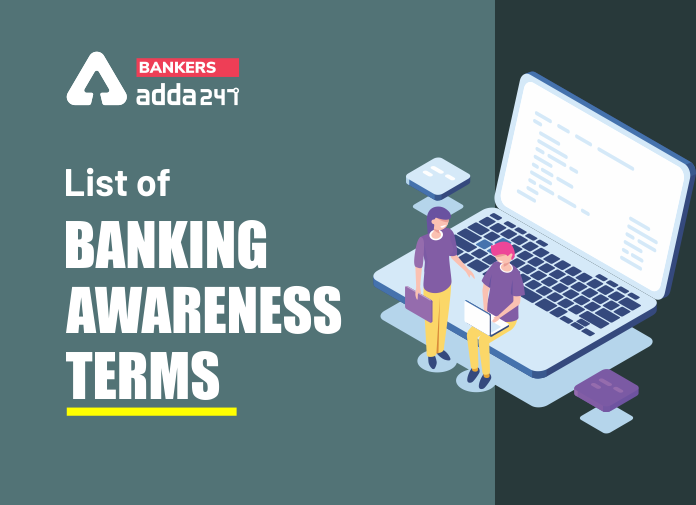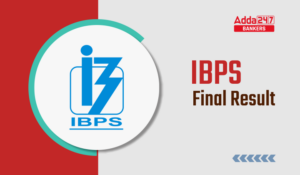Table of Contents
Based on past banking exam trend analysis , banking Awareness has become an important topic that will be helpful to all banking aspirants not only in cracking the General awareness section but also in cracking their interview. A banking aspirant in general as well, is expected to have at least the basic terms related to banking and that is why most of the questions asked in the interview are related to banking awareness terms. In this article, we are providing you some of the commonly used terms and their meaning which will be helpful for you to crack your exam. Make sure you go through this whole list which will be updated by us timely.
Also Check,
List of Important Banking Terms
Repo Rate
Repo rate is the rate on which RBI provides a loan to the bank for short-term between 1 to 90 days, RBI takes some interest from the commercial banks which is termed as Repo Rate.
Reverse Repo Rate
Reverse Repo rate is the rate on which bank deposit it’s excess money in RBI then RBI provides some interest to that bank and this interest is known as Reverse Repo Rate.
SLR –(Statutory Liquidity Ratio)
SLR a certain % of their total deposits in the form of (Gold + Cash + bonds + Securities) which every bank has to maintain with themselves at the end of every business days.
Cash Reserves Ratio
Cash Reserve Ratio is the ratio maintained by every bank which is a certain % of their total deposits with RBI in the form of Cash and Net demand & Time Liabilities.
Bank Rate
Bank Rate is the rate through which RBI charges certain % for providing money to other banks without any security for a Long period of time for 90 Days & Current Bank Rate is 6.75%.
Marginal standing facility
MSF basically refers to the rate through which bank can borrow funds for Short time – Overnight basis.
Retail banking
Retail banking is a type of banking in which a commericial bank directly deals with retail customers is done. This type of banking is also refer to as consumer banking or personal banking.
Green Banking
Green banking refers to promoting environmentally friendly practices and reducing your carbon footprints from your banking activities.
Non Performing Assets
NPA refers to non-performin asset of a bank which is not producing any income. After 90 days period and any consumer loans which are more than 180 days overdue., a bank classify an account as nonperforming assets
Inflation
Inflation refers to a State in which the Value of Money is Falling and the Prices are rising, over a period of time.
Cheque
A cheque is a non-negotiable instrument. It involves three parties for the exchange of money namely: Drawee, drawer and payee.
Credit Rating
‘Credit rating’ is the procedure of assessment of the creditworthiness of a borrower or a loan taker; creditworthiness defines as the ability of a borrower to ‘service the loan’, i.e., pay back the loan along with the interest.
CAMELS rating system
CAMELS is basically a rating system developed in the US that is used by supervisory authorities to rate banks and other financial institutions.
Bancassurance
Bancassurance is a concept in which the commercial bank sells the insurance products. This is one of the best way to grow profit for both the institutions.
CASA Account
CASA basically stands for Current Account Savings Account. The CASA ratio displays the value of deposits which is maintained in a bank in the form of current and savings account deposits in the total deposit.
RAFA Account
RAFA is an acronym used for Recurring Deposit Account Fixed Deposit Account. The RAFA ratio basically shows how much deposit a bank has in the form of Recurring and fixed deposits.
DEMAT Account
Demat Account refers to Dematerialized account. This bank account is mainly operated by citizens in India for trading in stocks or debentures which are listed in the stock market.
NOSTRO Account
A NOSTRO account basically refers to the one which is maintained by an Indian Bank in the foreign countries.
VOSTRO Account
A VOSTRO account basically refers to the one which is maintained in India by a foreign bank with their corresponding bank.
Insolvency
Insolvency is a consition of an organization, a family, person, or company which is declared as insolvent when they are unable to pay their debts back on time.
Bankruptcy
Bankruptcy refers to a legal declaration of a person who is unable to pay off debts.
FDI
Foreign Direct Investment refers to the investment when persons/companies who/which are non-Indian, invest in Indian companies.
Priority Sector Lending
Priority sector lending refers to the areas where as per the RBI guidelines, commericial banks are directed to distribute loans inorder to promote them and help them in growing.
List of Priority Sector are:
- Agriculture
- Micro, Small and Medium Enterprises
- Export Credit
- Education
- Housing
- Social Infrastructure
- Renewable Energy
- Others
Bitcoin
Bitcoin is one of the popular virtual currency/ cryptocurrency and a payment system that we use currently. Bitcoin can be defined as decentralized means of tracking and assigning wealth or economy, it is a software protocol. It doesn’t work under any government protocol.
Call money
Call money is the money borrowed by an institution on demand for a very short period.
Notice money
When an instution/person/organization borrowed or lent for more than a day up to 14 days it is called Notice Money.
Scheduled bank
All those commercial banks which are included in the 2nd Schedule of RBI Act 1934 are known as a scheduled commercial bank. These commercial banks are require to fulfil two conditions:
- First one is ,paid up capital and collected funds should not be less than Rs.5 Lacs.
- Second one is, any activity of the Bank should not adversely affect the interests of the customers.
Negative interest rate
When the demand is less for loans, the bank usually park their excess funds with the central bank through which they got intrest. Negative interest rate policy (NIRP) is a method through which central banks will deduct money from commercial banks for depositing their money with the central bank. and in turn, Commercial banks also do the same to common people and the end effect is that people will have to pay money to banks to hold their cash and this is refer as Negative Interest rate.
Blockchain system
Blockchain system is a system to simplify the transactions without the help of any third party in a secure manner and this is done through an anonymous online ledger (collection of financial accounts) which uses the data structure to simplify it is called blockchain technology.
Retail credit operations
Retail Credit Operations refers to the sequential process which generally involves screening, evaluation of risk(s), and ensuring that the bank lends to a creditworthy client from the asset products applications sourced.
Skimming
Skimming is basically a method which is used by fraudsters to capture customer’s personal or account information of credit card.
Money laundering
Money laundering refers to a process of conversion of illegal money from various sources to appear to have originated from legitimated (Legal) source. Some of the major sources of illegal money are tax evasion, bribe, Smuggling etc.
Direct Debit
Direct Debit refers to a financial activity in which one person withdraws funds from another person’s bank account. This is a facility in which the payee withdraws the amount from the payer’s account and the payer has instructed the bank to allow the payee directly withdraw the amount from the account.
Cash Credit
Cash Credit is basically a proper limit sanctioned by the bank to the borrowing manufacturing/trading unit against the value of the raw materials, semi-finished goods and finished goods including stores.
Bill of Exchange
A bill of exchange refers to a non- interest bearing written order which is used primarily in foreign trade which binds one party to pay a fixed amount of money to another party at a decided future date.
Core Banking Solutions
Core Banking Solution (CBS) refers to the networking of branches, which enables the customers to operate their accounts, and avail banking services from any branch of the Bank on CBS network, regardless of where he maintains his account.
Unified Payment Interface
UPI uses a single application programme interface with a series of Application Programme interface (API’S). The mobile devices are the primary object for all the payments that a customer make through UPI.
Micro ATMs
Micro ATMs refers to the advanced version of Point of Sale (PoS) having an additional feature of Biometric scanning.
Letter of Credit
The letter of credit is widely used as one of the negotiable instrument. It is used by the bank, that guarantee’s buyers’ payment to the seller shall be received on time along with the proposed amount to be paid. In any case, if the buyer is unable to make the agreed payment to the seller on the given time, then the bank will cover the full or remaining amount of purchase.
Banking Ombudsmen
Banking Ombudsman is a senior official who is appointed by RBI. He handles and redresses customer complaints against deficiency in any type of banking services.
A Balance of Payments
A Balance of payments refers to the list that states a country’s transactions with other countries for a certain time period (generally 1 year). Payments which are made into the country (receipts) are entered as positive numbers, called credits. Payments which are made out of the country (payments) are entered as negative numbers called debts.
LIBOR
The LIBOR is an acronym which is used for the London Interbank Offered Rate. It refers to a interest rate at which funds are borrowed by banks in marketable size, from other banks in the London interbank market.
MIBOR
MIBOR is an acronym used for Mumbai Interbank Offered Rate. It refers to the interest rate at which funds are borrowed by banks in marketable size, from other banks in the Mumbai interbank market.
Capital market
A capital market refers to an organised market which provides long-term finance for business.
Money market
Money market refers to an organised market which provides short-term finance for business
Balloon mortgage
A mortgage refers to the transfer of a right to stable property for the security purpose of a loan amount. They are just for short term and it has a fixed rate mortgage.
Retail credit operations
Retail Credit Operations refers to the sequential process which involves screening, evaluation of risk(s), and ensuring that the bank lends to a creditworthy client from the asset products applications sourced.
Minimum Reserve system of RBI
“Minimum Reserve System” is the current system of the Indian government to issue notes. As per this policy, the minimum reserves to be maintained in the form of gold and foreign exchange should consist of rupees 200 crores.
Clean note policy of RBI
Clean note policy is the policy under which to increase the life of currency notes and to provide the good quality currency notes and coins to the citizens of our country
The Balance of Trade
The value of difference between the country’s exports and the value of its imports are known as the Balance of Trade.
Legal Tender
The currency which can be circulated in the public for exchange is known as legal tender based on provisions of coinage Act 1996, bank notes, currency notes and coins (Re. 1 and above) are legal tender for the unlimited amount.
Currency Chest
Currency chests is the place where money is kept for the distribution in public and they are operated by the Reserve Bank of India (RBI) so that they can provide good quality currency notes to the public. On behalf of RBI Commercial banks open currency chests and monitor.
Amortisation
Amortization refers to the periodic payment of debt like a loan or a mortgage. Amortization is basically the arrangement of a lump sum cash flow into many periodic instalments over a span of time, which is also called amortization agenda.
Credit Crunch
A credit crunch refers to a condition in which there is an immediate decline in the availability of a loan or the credit. A situation, when suddenly the credit becomes difficult to get.
External Commercial Borrowings
External commercial borrowing refers to the money which is used for the financing of commercial activities in our country through foreign sources. They can be any form such as loans, credits or even security instruments.
Small Finance Banks
Kisan Vikas Patra
Kisan vikas patra refers to a small savings scheme launched by the Government of India and run by The Directorate of Small Savings and the Post Offices sell these saving bonds. It is similar to FD.
Interest Rate Swap
An Interest Rate Swap is basically a contractual agreement between two parties who agree to exchange the future interest rate payments that they make on loans or bonds.
Public credit registry refers to a database of credit information for India that is accessible to all stakeholders. It is maintained by a public authority like the central bank or the banking supervisor.
Off-Balance Sheet Exposure
Off-Balance sheet exposure signifies to those activities that are assets or liabilities of an entity which doesn’t appear on the balance sheet. For Example: Letter of the undertaking, Letter of credit etc.
Deposit Insurance and Credit Guarantee Corporation (DICGC)
The Deposit Insurance and Credit Guarantee Corporation (DICGC) is a wholly-owned subsidiary of the Reserve Bank of India which provides the insurance coverage to the depositors in case the bank has no money. Earlier the limit of insurance cover was 1lakh which is changed to 5 lakh recently.
NEFT – “National Electronic Fund Transfer”
NEFT is a type of payment system through which One can transfer funds to others though self-account. It is Applicable to both Account holders and Non-Account holders.
RTGS- “Real Time Gross Settlement”
RTGS is a again a payment settlement system through electronic media in which Settlement of fund transfer occurs according to individuals basis or it can be transferred instantly.
Retail credit operations
Retail Credit Operations refers to the sequential process which involves screening, evaluation of risk(s), and ensuring that the bank lends to a creditworthy client from the asset products applications sourced.
IMPS: Immediate Payment Services
IMPS is an instant interbank electronic payment system which is used to transfer money through mobile phones. This service is now available 24×7 for a transaction between interbank.
‘Fit and Proper’ Criteria for Elected Directors of PSB
The Reserve Bank of India has tightened the rules to elect directors on the boards of public sector banks, responding to criticism that boards of these lenders failed to prevent a build-up of bad loans in the previous lending cycle.
Liquidity:
Liquidity refers to the degree to which an asset or security can be quickly bought or sold in the market without affecting the asset’s price.
Plastic Money:
Refinance Facilities
Market Stabilization scheme (MSS)
It is scheme in which Securities are issued with the objective of providing a stock of securities to the RBI to intervene in the market for managing liquidity.
Open Market Operations (OMO)
It’s an activity by RBI to maintain the liquidity in the market by giving or taking liquidity in its currency to or from a bank or a group of banks.
Bonds
Bonds are used as an instrument of indebtedness of the bond issuer to the holders.
Debentures
Debentures refers to a long-term security bearing a fixed rate of interest, issued by a company and secured against assets.
Net Asset Value (NAV)
A mutual fund’s price per share or exchange-traded fund’s (ETF) per-share value is refer to as NAV.
General Anti-Avoidance Rules (GAAR):
It is GAAR which is a statutory rule that empowers a revenue authority to deny the taxpayers the benefit of an arrangement that they have entered into for an impermissible tax-related purpose.
Participatory notes or P-Notes
These are a form of instruments which is issued by registered foreign institutional investors (FII) to overseas investors, who wish to invest in the Indian stock markets without registering themselves with the market regulator that is the Securities and Exchange Board of India (SEBI).
BASEL Committee
This committee was established by the Central Bank governors of the Group of ten countries in 1974 and it seeks to improve the supervisory guidelines that central banks or similar authorities impose on both wholesale and retail banks.
Basis Point
Basis Point refers to one hundredth of one percentage point, basically used in expressing differences of interest rates.
Keep on visiting this article as we will keep on updating this list!
Click Here to Register for Bank Exams 2020 Preparation Material
Practice With,
Frequently Asked Questions?
Q. What is Repo Rate?
Ans. Repo rate is the rate on which RBI provides a loan to the bank for short-term between 1 to 90 days, RBI takes some interest from the commercial banks which is termed as Repo Rate.
Q. What is Reverse Repo rate?
Ans. Reverse Repo rate is the rate on which bank deposit it’s excess money in RBI then RBI provides some interest to that bank and this interest is known as Reverse Repo Rate.
Q. What is Prority Sector Lending?
Ans. Priority sector lending refers to the areas where as per the RBI guidelines, commericial banks are directed to distribute loans inorder to promote them and help them in growing.
Q. What is FDI?
Ans. Foreign Direct Investment refers to the investment when persons/companies who/which are non-Indian, invest in Indian companies.



 IBPS Final Result 2025 Coming Out Tomorr...
IBPS Final Result 2025 Coming Out Tomorr...
 Simple Tips to Avoid Common Mistakes In ...
Simple Tips to Avoid Common Mistakes In ...
 Important Topics & Shortcuts for IDB...
Important Topics & Shortcuts for IDB...


